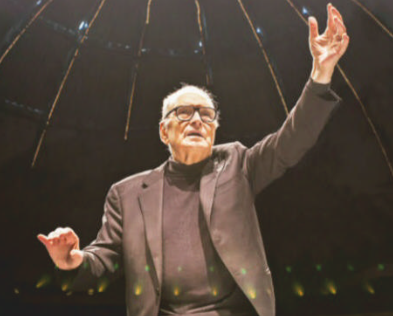He composed for the stage and the radio, but quit the national radio broadcaster, rai, when they wouldn’t let him freelance on the side. Branching out on his own, he refused to let himself be distracted, one reason why he continued living in Trastevere, travelled little and never bothered to learn to speak English. Hollywood, when it decided it wanted him, had to come to Rome. When his music came to him, it was fully formed. He would rise before dawn to write, composing at his desk on 12-staff paper with a pencil rather than experimentally at the piano.
莫里康內(nèi)為戲劇和電臺(tái)作曲,但在意大利國(guó)家電視臺(tái)不允許他兼職時(shí),他離開(kāi)了那里。自立門(mén)戶的他拒絕讓自己分心,這也是他繼續(xù)住在特拉斯提弗列、很少旅行以及從不費(fèi)心學(xué)英語(yǔ)的一個(gè)原因。即使是好萊塢,一旦決定要用他,也得躬身來(lái)到羅馬。一旦他的音樂(lè)靈感出現(xiàn),就已經(jīng)是完整的篇章。他會(huì)在黎明前起床創(chuàng)作,坐在書(shū)桌旁用鉛筆在12行五線譜紙上作曲,而不是在鋼琴上試彈。
His wife, Maria Travia, occasionally wrote the lyrics to his songs. He would play her his work, and only if she approved did he then show it to anyone else. A daily routine allowed him to experiment, first with Il Gruppo, an avant-garde free-improvisation collective in Rome for which he played the trumpet and the flute. But it was the soaring landscape of the cinema that allowed his composing to take flight.
莫里康內(nèi)的妻子瑪麗亞·特拉維亞偶爾會(huì)為他的歌曲填詞。他會(huì)為她演奏自己的作品,只有得到她的認(rèn)可,他才會(huì)給其他人聽(tīng)。例行的工作讓他有了嘗試的機(jī)會(huì),首先是和IlGruppo合作,這是一個(gè)在羅馬的前衛(wèi)的自由即興創(chuàng)作團(tuán)體,他為這個(gè)團(tuán)體演奏小號(hào)和長(zhǎng)笛。但讓他的創(chuàng)作得以翱翔天際的是高遠(yuǎn)遼闊的電影場(chǎng)景。

He liked using all the orchestra’s resources in his arrangements; his musicians would often find themselves playing instruments that they had never played before— the military snare drum, the jaw harp and, increasingly, the Fender Rhodes electronic piano. He wasn’t showing off; every note had a job to do. Changing one thing changed everything. In time he came to realise that his approach to composing was like his favourite grandmaster, Bobby Fischer’s approach to playing chess: a series of sudden and surprising moves.
他喜歡在他的編曲中使用管弦樂(lè)隊(duì)的所有樂(lè)器;演奏他曲子的樂(lè)師經(jīng)常會(huì)演奏他們以前從未演奏過(guò)的樂(lè)器-軍鼓、口簧琴,還有使用越來(lái)越多的芬達(dá)·羅茲電子鋼琴。他并不是在炫耀;每個(gè)音符都有自己的任務(wù)。改變一處就改變了一切。隨著時(shí)間的推移,他意識(shí)到自己的作曲方式就像他最喜歡的國(guó)際象棋大師,博比·菲舍爾下棋的方法:一系列突然而令人驚訝的招式。
譯文由可可原創(chuàng),僅供學(xué)習(xí)交流使用,未經(jīng)許可請(qǐng)勿轉(zhuǎn)載。












